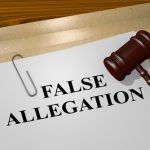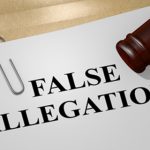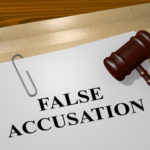False Sexual Assault Allegation Ruins Man’s Life

False sexual assault allegations are rarely publicised, and no official data is collected about them.
In fact, those who publicise these allegations can find themselves on the receiving end of criticism for reporting on an issue which they say pales in comparison with the prevalence and impact of sexual abuse.
But the fact that one issue exists should not mean another is ignored.
Criminal lawyers will attest to the fact that false sexual assault claims are more common and impactful than the mainstream media and victims’ rights advocates would like people to believe.
Indeed, the fact of the matter is that false sexual assault allegations ruin lives – devastating the mental state, reputation, career prospects and financial position of innocent people.
These allegations can have a permanent impact, whether or not the lies are exposed.
False allegations can also affect genuine victims, potentially leading to skepticism regarding the validity of their claims.
Victorian case
A recent case that did reach the news media is that of a Victorian man who ‘lost everything’ after his former wife accused him of sexual assault, as well as of leaving knives in her letterbox and sending threatening and pornographic texts to her friend – all of which were proven to be completely false.
False allegations
The man was charged in December 2019 with sexually assaulting his former wife.
He spend 10 days in custody before being granted bail on strict conditions, including a condition preventing him from seeing his son.
The man’s criminal defence lawyers presented evidence to the DPP establishing that their client was at work at the time the offence was alleged to have taken place, but prosecutors refused to withdraw the charge.
Instead, police re-arrested the man in April 2020 after his former wife made fresh claims that he left knives in her letterbox and sent threatening and pornographic texts to her friends, including threats to rape and murder them.
Investigators later uncovered the woman had bought the knives herself from Bunnings, and had sent the messages herself.
The woman was charged with making false accusations, attempting to pervert the course of justice and using a carriage service to send threats, with police asserting her claims were made to bolster the sexual assault allegation in circumstances where the plausibility of the woman’s assertions were under investigation.
The woman pleaded guilty to the charges, but it was not for another 5 months that police and the DPP concluded their investigations regarding the alleged sexual assault – consistent with defence submissions made nearly a year beforehand that the defendant could not have committed the offence.
The sexual assault charge was withdrawn as a result.
A life in tatters
As a result of the claims, the accused man lost his job, security licence, working with children permit, his friends, and his reputation.
He was labelled a rapist and an abuser, suffered the pain and humiliation of his family visiting him in prison, and was prohibited from seeing his son when released.
His mental state and finances are in tatters. In his words, ‘I have lost everything’.
The impact of the false accusations will be long-lasting, if not permanent.
DPP refuses to apologise or acknowledge the man is a victim of crime
Despite all of this, and even though prosecutors told a Victorian Magistrates Court that the woman fabricated evidence to have him convicted, the state’s Director of Public Prosecutions, Kerri Judd QC, has refused to apologise to him or accept he is a victim of crime.
The man is now considering civil proceedings against the state for false imprisonment and/or malicious prosecution, but this process could take years and the cost of legal fees may prove to be prohibitive.
The offence of making a false accusation in New South Wales
Section 314 of the Crimes Act 1900 (NSW) makes it an offence punishable by up to seven years’ imprisonment for a person to make an accusation intending for another person to be the subject of an investigation of an offence, knowing that the other person is innocent.
If the complainant testifies in court or swears a statement under oath, they may be prosecuted for the offence of perjury under section 327 of the Act, which carries a maximum penalty of 10 years’ imprisonment.
A person is guilty of perjury if it is proven they:
- Made a false statement under oath,
- It was made in, or in connection with, judicial proceedings,
- It concerned a matter which was material to those proceedings, and
- The maker knew the statement was false or did not believe it was true at the time it was made.
The maximum penalty for perjury increases to 14 years where the complainant committed the act with the intention to procure the conviction or acquittal of a person for a ‘serious indictable offence’ – which is one that carries a maximum penalty of at least five years in prison.
The complainant may also be charged with the offence of attempting to pervert the course of justice under section 319 of the Act the maximum penalty for which is also 14 years’ imprisonment.
To establish that offence, the prosecution must prove beyond reasonable doubt that:
- You engaged in an act or made an omission, and
- By that act or omission, you intended to pervert the course of justice.
Section 312 of the Act defines perverting the course of justice as, ‘obstructing, preventing, perverting or defeating the course of justice or the administration of law’.
Examples of the offence include:
- Attempting to bribe a police or judicial officer to avoid being prosecuted or punished,
- Falsely swearing or declaring that another person was responsible for an offence,
- Using another’s phone or email to manufacture a defence to a crime, and
- Encouraging or bribing another person to plead guilty to a crime they did not commit, or to provide a false alibi, or give false testimony in court.
Legal defences
Defences to charges of making a false accusation, perjury and attempting to pervert the course of justice include:
- Duress,
- Necessity, and
- Self-defence.
Where evidence of a legal defence is raised on the evidence, the prosecution is then required to disprove that defence beyond a reasonable doubt.
The defendant is entitled to an acquittal if the prosecution is unable to do so.
Why do people make false allegations?
People may make false accusations for any one or more of a range of reasons: to seek revenge against former partners, to bolster family law proceedings, for financial reasons and even to gain sympathy.
Some can result from false memories or other resurfacing trauma, or they may simply be a cry for attention and help during a difficult time.
Psychologists say a number of complex factors may be involved in any given case.
Frustrating for judges
Such claims can also be a source of frustration for judges.
After fourteen years in the Family Court of Australia, Justice David Collier asserted he has witnessed an increase in false allegations of child sexual abuse being made by women against their male former partners with a view to blocking contact with children.
”When you have heard the evidence, you realise that this is a person who’s so determined to win that he or she will say anything. I’m satisfied that a number of people who have appeared before me have known that it is one of the ways of completely shutting husbands out of the child’s life”, the judge remarked.
”It’s a horrible weapon.”
New training
Recently, the Federal Circuit Court and Family Court announced additional training to help judges better understand domestic and family violence, as well as the dysfunctional dynamics that can lead to false allegations in family court cases.






